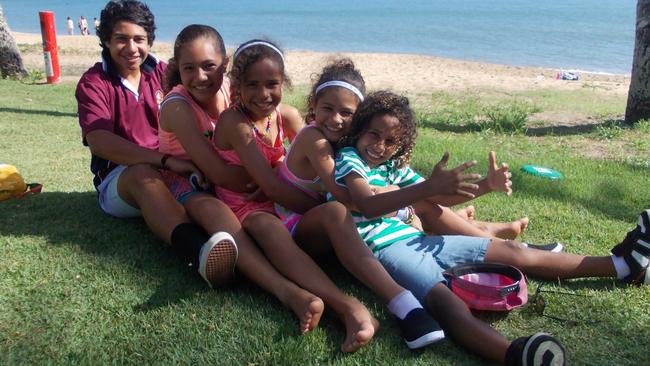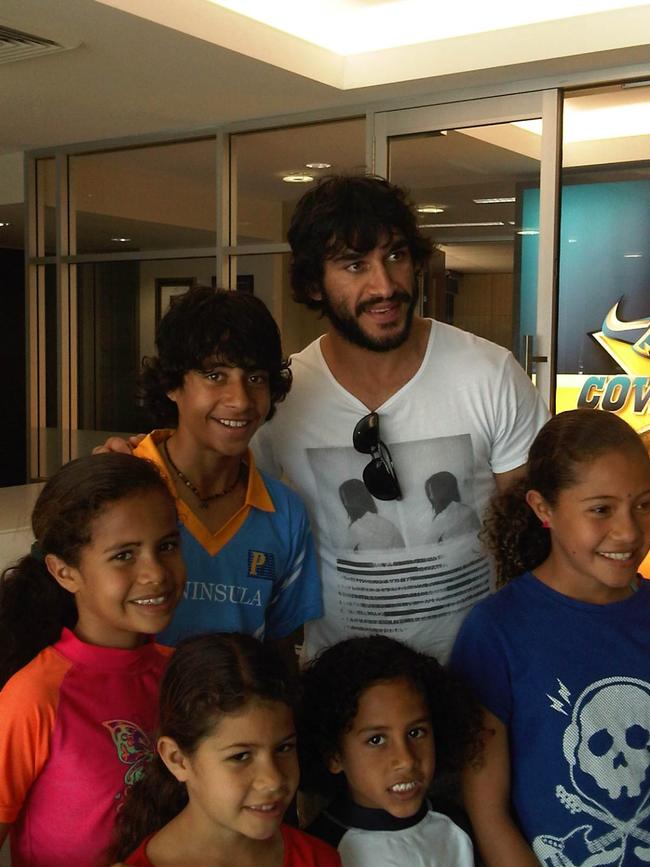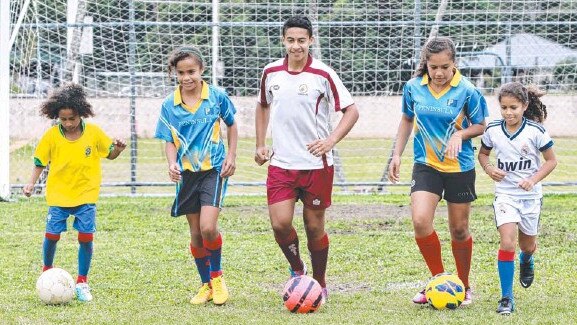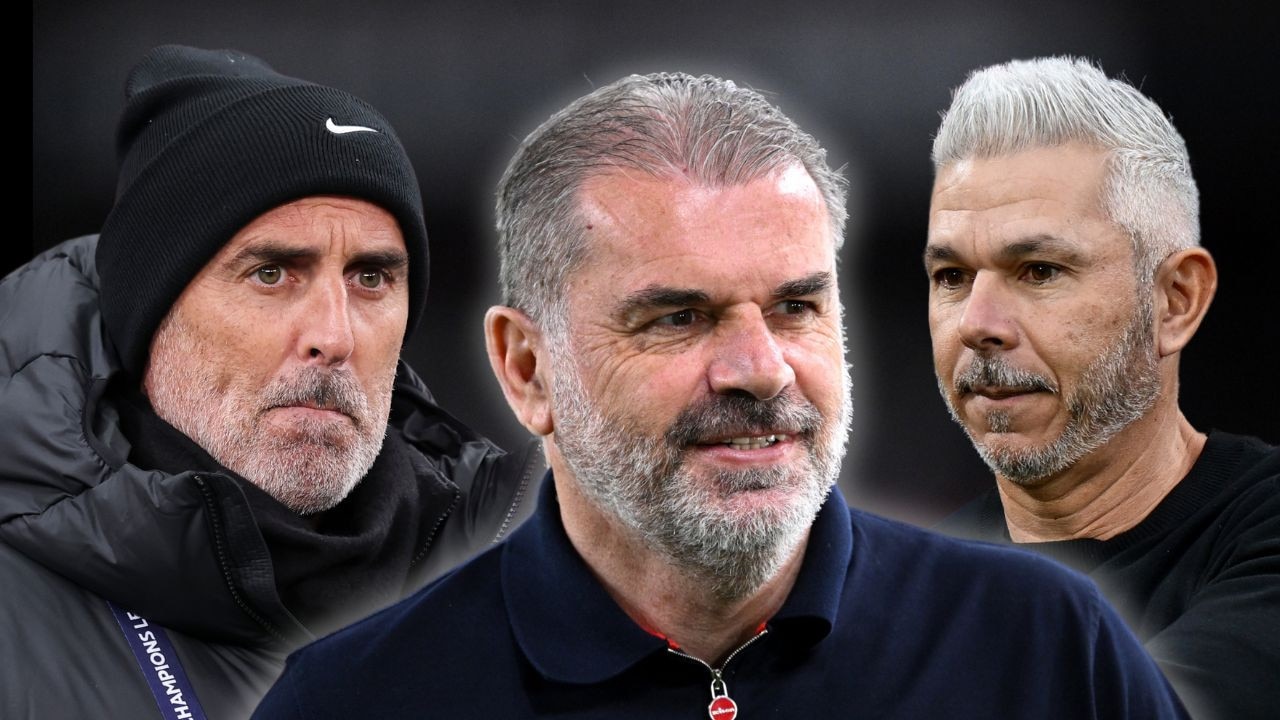Mary Fowler’s journey from Hotel Tarago to World Cup
Teenage star Mary Fowler has taken a long and winding road to the Women’s World Cup.

There’s something about Mary Fowler.
The Matildas’ youngest player at a World Cup is the Dutch-speaking daughter of an Irishman and Papua New Guinean.
Carried up Queensland’s coast inside her heavily pregnant mum, she learnt to kick a ball on the beaches of Cairns, where her parents finally settled.
At 16 and less than a year after being plucked from footballing anonymity, she is set to make her competitive Matildas debut at the Women’s World Cup — as long as a hamstring tweak suffered in training stays under control.
Fowler might be young, but her ambition is big.
The Year 11 student at Bankstown Girls High has a love of maths in the classroom, but it’s on the football field where she says she’s aiming to become the best in the world.
This ability and desire to succeed has not gone unnoticed by Matildas coach Ante Milicic and his predecessor Alen Stajcic, who identified her early.
Mary’s father Kevin certainly couldn’t have predicted his own path as one of 10 kids growing up in Dublin in the 1960s.

He was a talented 5000m runner — Mary inherited his cross-country genes — and he left Ireland in his 20s on a backpacking trip that took him to Papua New Guinea. He settled in the city of Mount Hagen, picked up a job as an aid worker and was introduced to Nido.
The pair married and lived in her village of Kila Kila before returning to Ireland to have the first two of five children, Quivi and Ciara.
After tiring of the Irish weather, they packed up and, via a brief stopover in The Netherlands where Nido’s sister lived, landed in Sydney in late 2002.
By then Nido was expecting again as the pair bought a LandCruiser and set off north.
“We drove up the coast not knowing where we were going to live,” Kevin said.
“When we ended up in Cairns, Nido was seven months pregnant with Mary. We put a tent up and stayed in a campsite for a bit until we were able to get ourselves into a rented house.”
Mary was born in February 2003, and Louise and Seamus followed soon after.
Every evening without fail, the family took dinner down to Trinity Beach, where they would complete in their own “Olympics”, complete with homemade podiums, medals and prizes.
It was there where all five siblings showed the first signs of their fiercely competitive streak.
“We’d just come up with our own random games,” Mary said. “We climbed a lot of trees at the beach.”

Football came off the back of those evenings on the beach.
“She’s pretty gifted,” said Stacey Fittock, who coached both Mary and Quivi at Leichhardt FC.
“I don’t know what sort of work they did on the beach out there to get both feet so strong and technically right.
“I don’t think I taught Mary anything, I just allowed the development to happen rather than restricting. And she could compete with boys older than her.”
At 10, Mary became the youngest player in the Queensland under-12 schoolgirls team. The coach at the time was former Matilda Sonia Gegenhuber, who said the quality of the youngster was “amazing”.
“To pick a 10-year-old in a state team they’ve got to have some qualities,” said Gegenhuber. “She had the footballing brain and the skill level — first touch, body position, vision, athletic ability.
“We were excited to think about her as an 11-year-old, however they went overseas.”
To The Netherlands, to be precise.
Kevin had been sending YouTube videos of Quivi to clubs in Europe and Liverpool’s academy offered him a trial before he was signed at age 16 to a three-year contract with Dutch side Vitesse Arnhem.
The family followed and Mary, by then 11, was training with senior women and trialled at FC Twente with Ciara, and her raw talent was further sharpened over the next three years with other trials in Europe and Australia.
The road to the Women’s World Cup has been tough for the Fowlers.
When the family struggled to make ends meet, they’d sleep in the car or in tents.
“At the high school they went to in Wollongong we were sleeping in a caravan park for eight weeks maybe,” Kevin said.
The family car became affectionately known as “Hotel Tarago” due to the frequency with which all seven family members stayed inside the people mover.
“I made a poem about it, actually,” Mary said.
“It was just part of our story, so … it’s probably another reason why our family is really close, because we had to go through all these things together.”

There have been plenty of adventures along the way with Mary, Quivi and Ciara training last year with former Manchester United strength and conditioning coach Mick Clegg.
“It was really good getting to work with him,” Mary said.
“Him being able to give me examples of how Ronaldo did stuff, and how Beckham did stuff. It was an awesome place to be in.
“I learnt a lot from him in terms of … training and mentality.”
The Fowler Five, as they call themselves, are a tight bunch and all share the footballing ability.
Oldest brother Quivi, 20, is preparing to train with Montpellier this Ligue 1 pre-season and Ciara, 17, Mary, 16, Louise, 15, and Seamus, 13, all play for Bankstown City.
Former coach Fittock said the kids motivate each other.
“It’s a family that just loves kicking a ball and being together and it’s all about fun and enjoyment,” she said.
“There’s no dictator … it’s good, healthy, a little bit of competition between the kids at a healthy level, but very, very self-motivated.”
Now the World Cup awaits for a teenager possessing what Stajcic last year labelled “the most amount of weapons I’ve seen from a young player her age in women’s football”.
If Mary gets on the field she’ll be the youngest Australian ever to play at a Women’s World Cup.
“She looks hungry,” Gegenhuber said.
“This is what she wants.”



To join the conversation, please log in. Don't have an account? Register
Join the conversation, you are commenting as Logout